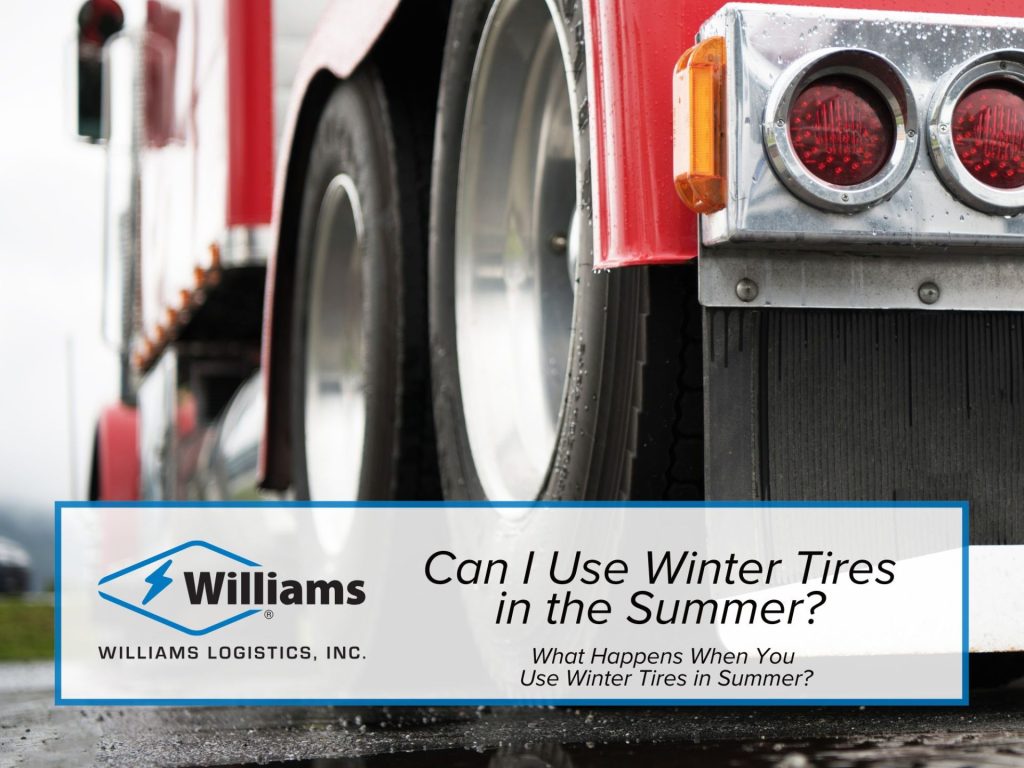At Williams Logistics, tire safety and performance are always top priorities. As the seasons change, a common question arises: Can you use winter tires in the summer? While it might seem convenient to keep winter tires on year-round, doing so can have significant drawbacks for both safety and cost. Here’s what every fleet manager and driver should know about using winter tires during the warmer months.
Why Winter Tires Are Different
Winter tires are engineered with a unique rubber compound and tread design to provide maximum grip in cold, snowy, and icy conditions. Their softer rubber stays flexible below 45°F (7°C), allowing for better traction and control when roads are slick or covered in snow. The tread patterns are deeper and feature more sipes (small slits) to bite into snow and ice, helping prevent slippage.
What Happens When You Use Winter Tires in Summer?
1. Accelerated Wear and Shorter Lifespan
The soft rubber compound that makes winter tires effective in the cold becomes a liability in the heat. On hot pavement, winter tires wear out much faster—sometimes up to 60% more quickly than if they were only used in winter. This means you’ll need to replace them far sooner, increasing your overall tire costs.
2. Reduced Handling and Safety
Winter tires are not designed for the demands of summer driving. In warm weather, their flexible rubber and aggressive tread can lead to:
- Less precise steering and cornering
- Longer stopping distances
- Increased risk of losing control during sudden maneuvers
Tests have shown that vehicles equipped with winter tires in summer conditions have up to 15% less accuracy in steering and require more distance to stop compared to those with summer or all-season tires.
3. Higher Risk of Blowouts and Hydroplaning
The heat of summer can cause winter tires to overheat, increasing the risk of blowouts. Their tread patterns, designed for snow evacuation, are less effective at dispersing water on wet summer roads, raising the risk of hydroplaning during heavy rain.
4. Decreased Fuel Efficiency
Winter tires have higher rolling resistance, which means your truck’s engine has to work harder to move. This leads to increased fuel consumption and higher operating costs for your fleet.
Why Not Just Use Winter Tires Year-Round?
While it might seem like a way to save time or money, using winter tires in the summer is a false economy. Not only will you spend more on replacements and fuel, but you’ll also compromise the safety of drivers and cargo. Additionally, worn winter tires won’t perform as needed when winter returns, putting your truck at risk when you need traction the most.
The Best Practice: Seasonal Tire Changes
For optimal safety, performance, and cost-effectiveness:
- Switch to summer or all-season tires when temperatures consistently rise above 45°F (7°C).
- Store winter tires properly during the off-season to extend their lifespan.
- Inspect tires regularly for wear, damage, and proper inflation.
Conclusion
Using winter tires in the summer is not recommended for commercial trucks or any vehicle. The risks—accelerated wear, reduced safety, higher costs, and compromised performance—far outweigh any perceived convenience. At Williams Logistics, we recommend following a seasonal tire strategy to keep your fleet safe, efficient, and ready for any road conditions.
By making the right tire choices, you protect your drivers, your cargo, and your bottom line.
